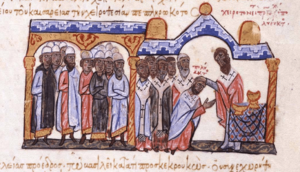Polyeuctus of Constantinople facts for kids
Quick facts for kids |
|
|---|---|
| Ecumenical Patriarch of Constantinople | |

Consecration of Polyeuctus, from the Madrid Skylitzes
|
|
| See | Constantinople |
| Enthroned | 956 |
| Reign ended | 970 |
| Predecessor | Theophylact |
| Successor | Basil I |
| Personal details | |
| Denomination | Chalcedonian Christianity |
Polyeuctus (Greek: Πολύευκτος; died 5 February 970) was a very important religious leader in the Byzantine Empire. He served as the Ecumenical Patriarch of Constantinople from 956 to 970. This means he was the highest bishop in the Eastern Orthodox Church, based in the city of Constantinople (today's Istanbul). His special day, or feast day, is celebrated on February 5.
Contents
A Leader of Faith
Polyeuctus started his life as a simple monk. But in 956, he became the Patriarch, taking over from Theophylact Lekapenos. He held this powerful religious position in Constantinople until he passed away on January 16, 970. People admired him for his intelligence, strong belief in his faith, and amazing speaking skills. They even called him a "second Chrysostom", comparing him to a famous early Christian leader known for his powerful sermons.
Standing Up for Beliefs
Even though Constantine VII helped Polyeuctus become Patriarch, Polyeuctus was very independent. He wasn't afraid to challenge powerful people, including the emperor himself. For example, he questioned the marriage of Emperor Constantine's parents. He also worked to clear the name of Patriarch Euthymius, who had strongly disagreed with that marriage. This showed Polyeuctus's dedication to what he believed was right, even when it was difficult.
Princess Olga's Baptism
A very important event happened during Polyeuctus's time as Patriarch. In 957, Saint Olga, a princess from Rus' (an early Russian state), visited Constantinople. She was baptized there by Patriarch Polyeuctus himself. The Byzantine Emperor Constantine Porphyrogenitus was her godfather. Polyeuctus made a special prophecy for her, saying: "Blessed are you among Russian women, for you have loved light and cast off darkness; the sons of Russia will bless you to the last generation." This event was a big step in bringing Christianity to the people of Rus'.
Challenges with Emperors
Polyeuctus was known for being very strict about church rules. He even had disagreements with emperors.
He had supported Nikephoros II in becoming emperor. However, Polyeuctus later excommunicated Nikephoros II. This happened because Nikephoros married Theophano, and Polyeuctus believed this marriage was against church law. He had also refused to give Nikephoros communion for a whole year because Nikephoros had married a second time after his first wife died.
When Emperor Nikephoros II Phokas was assassinated, Polyeuctus took a strong stand. He excommunicated the people who killed the emperor. He also refused to crown the new emperor, John I Tzimiskes, until John punished the assassins. Polyeuctus also insisted that Empress Theophano, who was believed to have planned her husband's murder, be sent away from the capital. This shows how much power and influence the Patriarch had, even over emperors.
Images for kids
 | Calvin Brent |
 | Walter T. Bailey |
 | Martha Cassell Thompson |
 | Alberta Jeannette Cassell |


